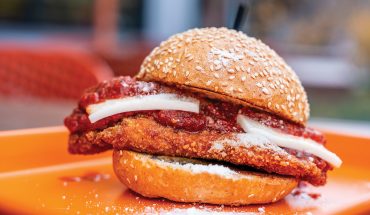by Tina Haver Currin
photographs by Chris Fowler
Caroline Morrison and Siobhan Southern knew they were on to something. Despite a cool reception from lenders, the two knew that Raleigh was ready for a purely vegetarian restaurant. Less than two years later, it’s clear not just that their instincts were right – but that they may have tipped off a full-bore trend.
By the time the two opened The Fiction Kitchen in January 2013 with help from $37,423 raised on Kickstarter, they were confident. For two full years, they’d thrown weekly pop-up vegan brunches at places like Durham’s Pinhook and Big Boss Brewery in Raleigh, events that sold out and developed a serious following. They “wanted to see if the community was going to be on board,” Morrison says. “Banks weren’t really behind us. They were like, ‘a vegan/vegetarian restaurant in Raleigh? No way.’ ”
Those banks should see them now. At 4:15 p.m. on a Friday, there’s a group of people waiting for the restaurant to open. By 5:30, when the stream of taillights on Dawson Street shows that people are just starting to leave work, the restaurant has only one table left. By six, the wait snakes out the door and around the restaurant’s lime-green building.
Every few minutes, you can hear Southern, who stays glued to the ticket machine, call, “Service please!” from the kitchen window. The food that comes out can’t be pegged to any one genre: There’s seared tofu in a rice base, followed by tinga tacos and what may be Fiction Kitchen’s signature dish, vegan chicken and waffles.
As night falls, the crowd – and the waiting list – only grows. “I have a feeling that when folks drive by and see people waiting in the street, someone is going to say, ‘I can do that even better,’ ” says Morrison. “I want them to do that. I want people to open other restaurants and bring innovative vegetarian cuisine to this area.”
In fact, that’s happening. The Fiction Kitchen may be Raleigh’s only truly vegetarian restaurant, but that doesn’t mean it’s the only place for vegetarian cuisine. The Remedy Diner on Hargett Street and Capital Club 16 on West Martin Street offer menus nearly split between vegetarian and traditional options. Indian-inspired Garland, nearby, offers seasonal, rotating vegetarian dishes. Around the corner, Chuck’s, which draws some of the area’s most die-hard meat lovers with its proudly limited menu, is also home to one of the Triangle’s most substantial veggie burgers. It all points to a larger trend.
But the choices here – and the community support – weren’t always so plentiful.
For nearly four decades, The Irregardless Café was the prominent spot in downtown Raleigh for those with an alternative diet. The café, owned by Anya and Arthur Gordon, was truly at the vanguard when it began serving vegetarian-friendly, farm-to-table fare in 1975.
“In the 1970s, there was a real commitment to recycling and conserving energy, but something happened in the ’80s and ’90s. It was collective amnesia,” says Anya Gordon, who works as the restaurant’s marketing director. “Arthur was recycling from the beginning, and he was buying from local farmers. We compost everything. We have a community garden.”
Though Irregardless was founded as a strictly vegetarian restaurant, every seven years, Arthur has introduced a new protein to the plate: First fish, then chicken, and eventually, red meat. But the two still consider it a vegetarian restaurant. “Back then, if it stayed just vegetarian, we would have gone out of business.” Gordon states. “But, in the last 16 years, Raleigh’s food culture has changed profoundly. The whole city has just grown up.”
Leading the charge
The Irregardless Café was 5 years old when Jeremy Barnes, who has been a pioneer of vegetarian cuisine in the Triangle, was born. Barnes grew up in Lizard Lick, a small town about 20 miles east of Raleigh, best known in the 19th century for bootlegging and, more recently for the reality television show based upon the tow-truck company of the same name. It’s a traditional Southern town with a traditional Southern diet; Barnes was raised on fried chicken and pulled pork. When he became a vegetarian, he wrestled with how to honor the classic flavors of his childhood – minus the meat.
He quickly learned that there weren’t many options for a diet like his. When he went out to eat with his family at places like Olive Garden or Sweet Tomatoes, he subsisted upon sides of vegetables, elaborated upon only in size, not in creativity. It was as though chefs assumed vegetarians had no passion for food, flavor, or originality – the reasons people go to restaurants in the first place.
Barnes started working at Whole Foods in Cary in 2001. But he was discouraged by the lack of options for a Southern vegetarian, even in the notoriously earthy grocery store.
“You can’t just dive in and eat a bowl of lettuce with tofu. It just doesn’t work,” says Barnes. “I felt like vegans were doing the hard work, whether it be for animal rights, moral reasons, or for their health. They deserved something that tastes good.”
So he began crafting recipes in his spare time. He believed the most effective way to get people to try his food was a “ramp approach,” meeting people where they were, rather than forcing them to take large, uncomfortable steps in an unfamiliar direction. He also believed there was a way for vegetarians to retain some of those traditional Southern flavors.
One of his first vegan dishes was one of his most successful: Jeremy’s Mock Crab Cakes. “I loved pulled pork, I loved chicken salad, I loved crab,” Barnes remembers. “So, I asked if I could try this recipe, and everybody liked it.” Jeremy’s Vegan Meatloaf and Jeremy’s Mock BBQ – a tangy, vinegar-based soy creation that’s become a prepared foods staple – followed shortly thereafter.
Those dishes are now served in Whole Foods Markets across the country, and Barnes still frequently receives calls from new stores requesting the recipes.
Though he’s no longer behind the prepared foods case, he is encouraged by the change he’s seen in the region’s acceptance of vegetarian diets.
“The quality of options is completely night and day from when I started. I think one of the most evident changes is vegan and vegetarian options in grocery stores… It’s been a slow transition, but definitely an evident one.”
Breaking out
Like Barnes, Fiction Kitchen executive chef Caroline Morrison was also raised in the South, and she struggled to find food that she enjoyed after giving up meat 16 years ago as a student at Western Carolina University.
“Oh, my God,” says Morrison, laughing. “It was portobello sandwiches and steamed veggies, or a salad bar with shredded cheddar cheese and cherry tomatoes. Completely boring.” That boredom, which first frustrated her, eventually became a catalyst for change. She left a job at IBM to attend culinary school at Wake Tech and began crafting meatless versions of some of her favorite foods.
“My family is from Halifax County, which is very Eastern North Carolina pork country. I grew up eating barbecue with heavy sauce. I wanted to create some of those textures and memories without the harm, so that’s part of what’s behind the Fiction Kitchen. I wanted to recreate some of what I grew up on.”
Morrison’s the first to admit that becoming a vegetarian, a relatively simple choice at the time, eventually changed her life. “It made me see that I wanted to be a chef and a leader, and I wanted to start something in our community. I didn’t care what it was going to take,” she says, cracking a mischievous smile. “I was going to open a vegetarian restaurant in the South, because it needed to happen. In our town. In Raleigh. And you know what? I talked about it enough that it did.”
Recipes
Fiction Kitchen’s Caroline Morrison
Curried Pumpkin Soup
1 small onion, chopped
2 carrots, peeled and chopped
1 bay leaf
2 tablespoons vegan Earth Balance Buttery Spread (or butter or olive oil)
2 cloves garlic
1 teaspoon fresh ground ginger
1 teaspoon your favorite curry powder
½ teaspoon garam masala
1 dash cayenne (only if your curry powder does not contain cayenne)
1½ tablespoons agave nectar
1 cup pumpkin (if using fresh, make sure it is roasted and pureed, or canned)
3 cups vegetable stock
4 tablespoons vegan sour cream (or sour cream)
Salt to taste
Fresh cilantro sprigs for garnish
Toasted pumpkin seed for garnish
Put chopped onion, carrots, bay leaf and buttery spread in a medium sauce pan on medium-low heat and sweat until tender. You don’t want to add color to the vegetable here, just soften. This could take about six minutes. Add the garlic and ginger, then cook for two more minutes. Add the pumpkin, spices (except salt) and agave. Stir and let the pumpkin warm through. Once the pumpkin is hot, remove the bay leaf. Transfer the mixture to a blender. Put one cup of the stock in the blender with the pumpkin mixture. Cover the blender and hold the lid on with a towel. Blend until you have a thick puree. Now add one more cup of stock. Blend again, making sure there are no chunks. Move the mixture back to the sauce pan and add the remaining cup of stock. Stir well and bring back to a low simmer. Once simmering, fold in the sour cream and turn off the heat. Season to taste with salt. Serve warm with cilantro and toasted pumpkin seeds as a garnish. You could even add a little swirl of sour cream if you wish. Enjoy!
Yield: Four 8-ounce servings
Garland’s Cheetie Kumar Basic Quinoa Pilaf
Quinoa has been a part of the Andean diet for thousands of years, cherished as an easy-to-grow crop with lots of nutritional value. It has a great springy texture and slightly nutty flavor. Considered a “superfood,” it is gluten free and provides complete protein on its own. This recipe is like a pilaf you would make with rice and is good hot, at room temperature, or even cold. Quinoa grains have a naturally soapy coating. Though most of the quinoa available today has the coating removed, it’s important to rinse the quinoa thoroughly before cooking.
2½ tablespoons extra-virgin olive oil
1 medium/large or two small shallots, finely diced
1½ tablespoons ground cumin (preferably freshly ground seeds)
1½ cups quinoa, rinsed and drained
2½ cups water or mild vegetable stock
2 teaspoons kosher salt
Black pepper to taste
1 carrot, finely diced
Zest and juice of 1 lemon
½ cup (or more) chopped parsley (or other herbs, optional)
Heat oil in a wide skillet until hot but not smoking. Add shallot and a sprinkle of salt and cook until translucent. Add cumin and incorporate throughout shallot. When fragrant, add drained quinoa and fold into shallot till all the quinoa is coated with oil and begins to smell a little toasted. Add water (or stock), salt and pepper, raise heat and quickly bring to a boil. Stir and cover as tightly as possible. Turn the heat to low and cook for nine minutes. Quickly remove cover, add carrots, stir, and replace cover (there should still be some water remaining in pan). Cook for another three minutes. Without removing cover, remove from heat and let sit for five minutes. Add lemon juice and zest and fluff with a fork, combining lemon throughout. Let cool slightly and add parsley if using.
Use this basic technique and experiment with additions of seasonal vegetables, nuts, dried fruit and spices, or whatever you have on hand.
Yield: 4 to 6 servings
Jeremy Barnes, Whole Foods Vegan White Chocolate Chip & Macadamia Cookies
1 cup vegan Earth Balance Buttery Spread
½ cup brown sugar
½ cup white sugar
¼ cup soy milk
1 teaspoon vanilla extract
2¼ cups all-purpose flour
1 teaspoon baking soda
½ teaspoon salt
1 bag vegan white chocolate chips
½ cup chopped macadamia nuts
Preheat oven to 350 degrees. In a large bowl, cream together buttery spread, brown sugar and white sugar with a fork. Add soy milk and vanilla extract and mix together, then set aside. In a medium bowl, whisk together flour, baking soda and salt. Pour this flour mixture into bowl with “butter” mixture and incorporate thoroughly with a fork. Add white chocolate chips and macadamia nuts and mix together. Use a large tablespoon and spoon out onto ungreased sheet pan with at least one inch between each one. Bake for eight to 10 minutes. Cookies usually finish while sitting on hot pan, so you may want to try a few at eight minutes to see how hot your oven runs. Cool for three to five minutes and enjoy!
Yield: Approximately 12 cookies.







